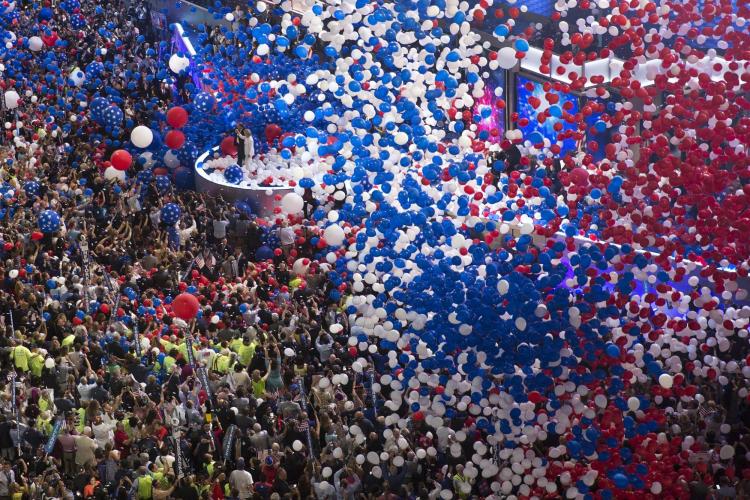Campus Q&A: How many U.S. presidential candidates are too many?

Scenes from the 2016 Democratic National Committee convention.
With 19 candidates already in the running, and former Vice President Joe Biden officially entering the race Thursday, the 2020 Democratic nominating contest for president is shaping up to be one of the most crowded in history, says CU Boulder Political Science Professor Kenneth Bickers.
“No major party in the United States has ever had this many candidates who were, by objective standards, viable to be running for the White House,” Bickers said. “The more candidates, the more contentious the process is likely to be.”
We sat down with Bickers to discuss how the large field could shape the campaign, what Biden adds to the contest and how recent rule changes governing the role of superdelegates could make for a nail-biter of a Democratic Convention in Milwaukee in July 2020.
Historically, has a big field helped a party win the White House?
It’s been a mixed bag. In 1988 the Democrats had a big field, and George H.W. Bush was elected president. In 1992, there was a large field on the part of the Democrats and Bill Clinton won the White House. In the most recent election, there were 17 Republican candidates going for the Republican nomination and Donald Trump won the White House.
Many Democratic candidates appear to be leaning more to the political left than in previous years. Will such a broad diversity of ideas help or hurt the party’s White House bid?
That will be determined by how unified the party can be after the contest. If it fragments the party, and there are hurt feelings, some Democratic voters may stay home if their candidate doesn’t get selected.
I don’t necessarily think that will be a big problem for the Democrats in 2020. They are so unified in wanting to see Donald Trump defeated that they will likely rally around whoever the candidate is. But getting to that point could be messy, and that could impact independent voters. If they’re turned off by what they see, if they say to themselves ‘the Democrats don’t even like their own candidate,’ that could hurt Democrats’ chances.
How important will independent voters be in 2020?
The country is very closely divided between the two parties, and independents often represent the last swing vote that determines who wins. For instance, post-election surveys showed that about 20 percent of the counties that Barack Obama carried in 2008 or 2012 swung to Donald Trump in 2016. Independent votes are very much at play and both parties are going to be working hard to win these folks over.
What does Biden add to the field?
He is the ultimate establishment candidate and is probably viewed as the most centrist in the field. To my mind, Biden is one of the few candidates who could challenge Trump for support of blue collar working class voters, which were the base of Trump’s support in 2016. He does have some baggage, including recent allegations of handsiness, but he has probably benefited from having those come out now rather than when the campaign is in full-swing.
What will the big issues be this election cycle?
The big issues for Democratic candidates right now appear to be climate change and health care, but if you look at voter surveys, health care is almost always number two and climate change is almost always near the bottom.
What’s the number one issue for voters? The economy: jobs, job security, wages. Right now Donald Trump looks really strong on those issues and the Democrats have the advantage on healthcare.
In 2018, the Democratic National Committee passed reforms to limit the influence of superdelegates. What’s changed and why does it matter?
Since the 1980s, the Democratic Party has had superdelegates—party leaders and elected officials who, unlike regular delegates, are not pledged to a certain candidate and can vote however they please at the convention. This tended to benefit the establishment candidate—in a close contest the superdelegates (which make up as much as 18 percent of votes) could push them over the top.
Under the new rules, superdelegates can’t vote on the first ballot unless one candidate has such a majority that their vote doesn’t make a difference. If it goes to a second ballot, the superdelegates get to vote and the regular delegates are no longer pledged. We have not gone to a second ballot in either party for almost 70 years, but with this set of rules and this big a field it is entirely possible. If that happens, all bets are off and all delegates are free agents. It could get interesting.


